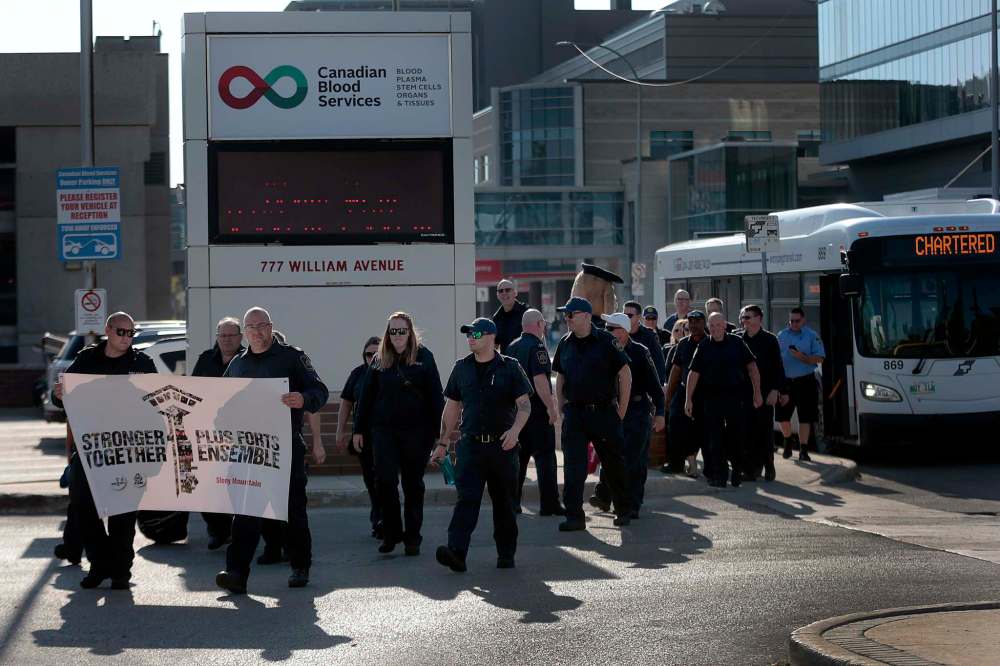Prison guards put work issues in federal spotlight
Advertisement
Read this article for free:
or
Already have an account? Log in here »
To continue reading, please subscribe:
Monthly Digital Subscription
$0 for the first 4 weeks*
- Enjoy unlimited reading on winnipegfreepress.com
- Read the E-Edition, our digital replica newspaper
- Access News Break, our award-winning app
- Play interactive puzzles
*No charge for 4 weeks then price increases to the regular rate of $19.00 plus GST every four weeks. Offer available to new and qualified returning subscribers only. Cancel any time.
Monthly Digital Subscription
$4.75/week*
- Enjoy unlimited reading on winnipegfreepress.com
- Read the E-Edition, our digital replica newspaper
- Access News Break, our award-winning app
- Play interactive puzzles
*Billed as $19 plus GST every four weeks. Cancel any time.
To continue reading, please subscribe:
Add Free Press access to your Brandon Sun subscription for only an additional
$1 for the first 4 weeks*
*Your next subscription payment will increase by $1.00 and you will be charged $16.99 plus GST for four weeks. After four weeks, your payment will increase to $23.99 plus GST every four weeks.
Read unlimited articles for free today:
or
Already have an account? Log in here »
Hey there, time traveller!
This article was published 16/09/2019 (2289 days ago), so information in it may no longer be current.
Dozens of correctional officers at Manitoba’s Stony Mountain Institution gave their blood — and a piece of their minds — Monday in Winnipeg, using a group blood donation to highlight issues affecting federal prison guards in Canada ahead of the upcoming election.
James Bloomfield, Prairies regional president for federal correctional officers union UCCO-SACC-CSN, said prison guards like himself are well-acquainted with the need for blood donations, given their experience responding to violent incidents.
Bloomfield said the union for federal prison guards doesn’t support a specific political party in the 2019 election.

However, he said correctional officers are worried about recent changes to administrative segregation in Canadian prisons, a practice more commonly known as solitary confinement. In response to court rulings, the Liberal government this year passed a bill to reform administrative segregation in favour of new “structured intervention units.”
According to Bloomfield, those changes won’t help correctional officers manage behavioural issues among inmates.
“We are now more susceptible to assaults than we have ever been before,” he said. “Repercussions for the inmates are very little in these situations.”
The union also pushed its stance against needle exchange programs for injection drug users in federal prisons.
“It’s supposed to be to avoid transmission of diseases,” said Bloomfield. “However, the first time that we had this in our institution — everybody, common sense will tell you that inmate is going to share that needle, and that’s exactly what we found happened.”
Bloomfield wants federal political leaders to recognize correctional officers as first responders, and to be included in legislation that affects those emergency workers.
“We want to ensure that as we go forward, things such as the death benefits for first responders, we need to be included in that federally. And that’s what we’d like to see from the political parties at this point, is to understand that our workplace is very dangerous, our workplace is very unique, and as a group, we need to be supported by both our government, as well as our employer, through this process of change.”
Justin Kelsch, the union’s local president for Stony Mountain, said he doesn’t feel like Ottawa prioritizes correctional officers’ safety.
“Our institution in Manitoba here had six (prisoner) murders in two years… Our safety should be topmost priority, and we don’t see any of the parties really coming out and saying that we’re going to give to officers,” he said.
“We need more officers in the institutions, they’re not hiring more officers. And the removal of (administrative) segregation is just going to make our institutions a lot more dangerous.”
solomon.israel@freepress.mb.ca
Twitter: @sol_israel















